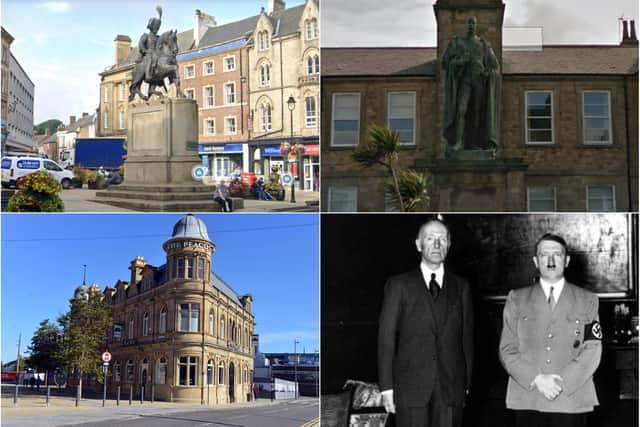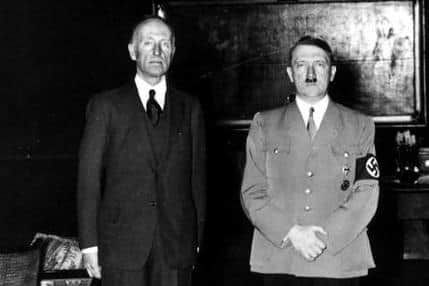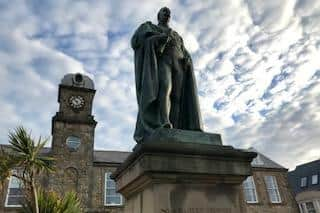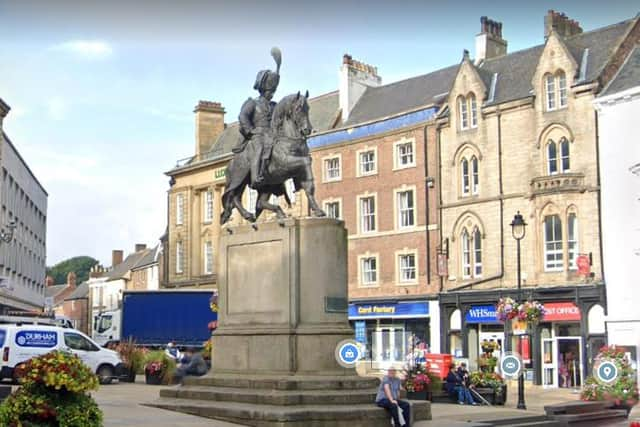Duels, mining and a friendship with Hitler - 200 years of the Londonderry family
and live on Freeview channel 276
The Londonderry title and an associated name you probably recognise, Vane-Tempest, looms large in the region’s rich mining heritage, as well as in politics and military history. Statues stand while mines and pubs were named in their honour.
Its holders have been accused of many things, although blandness is not among them. So who were they? Here’s a quick history.
Advertisement
Hide AdAdvertisement
Hide AdRobert Stewart 1st Marquess of Londonderry, born Ulster 1739, married well, inherited better and was an MP in the Irish parliament.


Second of his 13 known children was Robert Stewart, 2nd Marquess, who was essentially put in charge of Ireland and remembered for ordering the execution of William Porter, a clergyman who had previously canvassed for Londonderry at an election.
However, after expressing the wrong opinions, Robert had Porter hanged for treason, despite pleas for clemency from his (Londonderry’s) wife and sister.
In 1809 he fought a duel with future Prime Minister George Canning. Londonderry was understandably confident. Canning had never fired a pistol in his life. Robert liked those odds, yet still only managed to hit Canning’s leg.
Advertisement
Hide AdAdvertisement
Hide AdHe was disliked by almost everyone, including Georges III and IV and poets Shelley and Byron; partly because of his approval of the 1819 Peterloo Massacre. Nevertheless, he became Foreign Secretary, a position he held when committing suicide, childless, in 1822.


In the credit column, he visited revolutionary France; a brave move for an aristocrat. He also became strongly anti-slavery.
His half-brother Charles, 3rd Marquess, served in the army with some distinction under Wellington during the Napoleonic Wars. But historians are less generous thereafter.
A spoiled brat of a man, he changed his name to Charles Vane to suck up to his rich father-in-law, Sir Henry Vane-Tempest. Using the old man’s cash, he bought Seaham Hall estate.
Advertisement
Hide AdAdvertisement
Hide AdNow a mine owner, he decided he needed even more money and attempted to bully the River Wear Commissioners into giving him exclusive rights to export coal from the port. Refusal led to the inevitable tantrum and he vowed to ruin Sunderland, although he never did.


He went berserk at the Mines Act 1842. As if the idea of paying people a fair wage wasn’t bad enough, it also stipulated that the under-10s should not be working down the pits. This was the thin end of the wedge. He had generously agreed to a lower age limit of eight.
He fumed at the whingers: “The underground roads could not be made of sufficient height for taller persons, without incurring an outlay so great as to render the working of such mines unprofitable."
One of the richest men in Europe, big-hearted Charlie donated £30 to the Irish Potato Famine relief effort, while spending only £150,000 (about £18 million in today’s money) on renovating his Irish home.
Advertisement
Hide AdAdvertisement
Hide AdHe died in 1854 and his amusingly outsized equestrian statue stands today in the centre of Durham.


His son and heir, Frederick, 4th Marquess of Londonderry, has the distinction of being the only person in this story to be called Frederick. His rather more progressive views saw him fall out with his father.
In 1838 he was injured in a duel with the husband of an Italian opera singer he was conducting an affair with. Freddie and the singer, Giulia Grisi, had an illegitimate son. Hubby failed to dismiss the matter with a light laugh.
Freddie was another MP. But his life ended sadly in 1872 when he died in a mental institution. Without a legitimate heir, he was succeeded by his half-brother.
Advertisement
Hide AdAdvertisement
Hide AdGeorge Henry Robert Charles William Vane-Tempest, 5th Marquess is best remembered among the Londonderrys for having the longest name. Most men in those days were called either George, Henry, Robert, Charles or William, so this bloke played it safe by having the set.
This MP for Durham was rather unremarkable for good or ill. He died in 1884 and was succeeded by his ghastly eldest son Charles, the 6th Marquess, who genetically inherited much from his granddad.
Old Etonian Charlie was yet another MP who held a string of cushy jobs besides. In those days it was possible to attain such sinecures merely by being well connected. It averted any cumbersome requirement of talent.
He’s most noted in Sunderland for the notorious Silksworth Evictions of February 1891. His miners were increasingly unhappy about the number of fatalities at Silksworth Colliery.
Advertisement
Hide AdAdvertisement
Hide AdCharlie found the complaints wearisome and ignored them. Miners consequently joined a union and began to strike.
Four months into the strike Londonderry enlisted bailiffs to eject striking miners and their families from their homes, which he owned and rented out. By March work had resumed and the families were allowed home.
Sunderland MP and Echo founder Samuel Storey raised the matter in parliament. Home Secretary Henry Matthews dismissed the matter out of hand.
The laugh-a-minute 6th Marquess died in 1915. Son and heir Charles, 7th Marquess, was a controversial figure; although the reader has perhaps now passed the point of surprise at this revelation.
Advertisement
Hide AdAdvertisement
Hide AdAlthough not the brightest his parents insisted, as parents so often do, that he become MP for Maidstone. He had graduated from Sandhurst in 1897 and it should be mentioned that he witnessed some excessive horrors of World War One first hand, at Ypres and the Somme.
He held political offices under Conservative, Labour and Liberal Prime Ministers, but is regrettably best remembered now for his antisemitism and friendship with Hitler.
The character of Lord Darlington, the Appeasement fanatic in the novel Remains of the Day, is based on Londonderry. He was also second cousin to Winston Churchill, who referred to him as “that half-wit Charlie Londonderry”.
Things have been relatively quiet in the Londonderry family since Charlie’s death in 1949. Today we’re up to the 10th Marquess;by all accounts a sound fellow. Laudable with so much to live down to.
